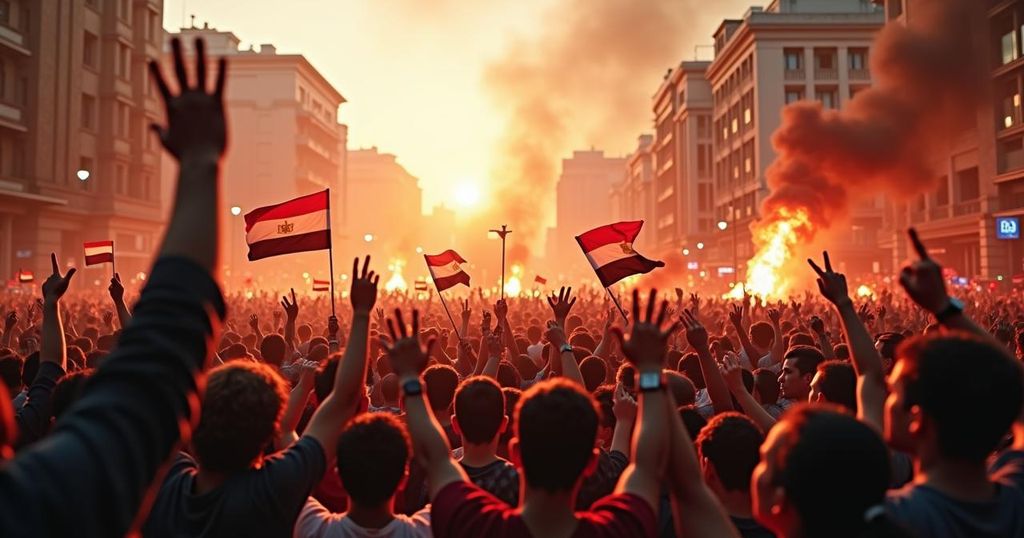The Evolution of the Muslim Brotherhood in Post-Mubarak Egypt
The Muslim Brotherhood’s significant role in Egypt’s political landscape was highlighted during the 2011 protests leading to Mubarak’s resignation. They established the Freedom and Justice Party and achieved electoral success, culminating in Mohammed Morsi’s presidency. However, Morsi’s governance faced opposition, leading to a military coup in 2013, resulting in the Brotherhood’s suppression and designation as a terrorist organization.
In January 2011, a secular youth-led protest movement emerged against President Hosni Mubarak’s regime in Egypt. The Muslim Brotherhood, initially hesitant, ultimately endorsed the protests, which resulted in Mubarak’s resignation in February. Following this, the Brotherhood adopted a strategic approach to engage in politics, insisting it would not pursue a legislative majority or nominate a presidential candidate. However, by May, the prospect of a presidential candidate arose with Abdel-Moneim Abul-Fotouh’s declaration to run, leading to his expulsion from the Brotherhood. In April 2011, the Muslim Brotherhood established the Freedom and Justice Party, seeking official recognition from the interim government. This party purported to uphold Islamic principles while remaining non-confessional, accommodating women and Christians. By June, the party gained significant electoral success, securing nearly 47% of the People’s Assembly seats in elections conducted from November 2011 to January 2012, with the ultraconservative Nūr Party following at 30%. Fast-forwarding to March 2012, the Brotherhood declared that Khairat al-Shater would be their presidential candidate, a move that conflicted with prior statements about abstaining from seeking the presidency. Following Shater’s disqualification due to his past convictions, Mohammed Morsi emerged as the candidate, eventually winning the presidency. Morsi’s administration faced substantial opposition by 2013, primarily regarding his governance of the economy, security, and public services. A sizeable protest demanding Morsi’s resignation on June 30 led the military, under General Abdel Fattah al-Sisi, to intervene on July 3, ultimately suspending the constitution and ousting Morsi, who was arrested alongside other Brotherhood officials. In the aftermath, the military exhibited a severe crackdown on the Muslim Brotherhood. Public protests erupted, leading to violent clashes resulting in numerous fatalities among Brotherhood supporters. The military’s call for public support culminated in massive gatherings favoring military actions against perceived violence. Subsequent to the crackdown, authorities declared a state of emergency and reverted many suppression strategies reminiscent of the Mubarak era, culminating in a formal ban on the Brotherhood in September 2013 and its later designation as a terrorist organization, despite the Brotherhood’s disavowal of violence. The regime’s retaliatory measures included mass arrests and trials condemning many to death or life imprisonment, following the challenging legacy of Morsi’s brief presidency.
The Muslim Brotherhood, founded in Egypt in 1928, is a significant political and social movement rooted in Islamic principles. It has historically oscillated between activism, political participation, and periods of repression under various regimes. The 2011 protests served as a pivotal moment, shifting public engagement and forced the Brotherhood into a visible political arena post-Mubarak. However, subsequent developments marked a tumultuous period characterized by both electoral success and severe governmental backlash, leading to the organization’s criminalization and designation as a terrorist group. This trajectory highlights the complexities of political Islam in Egypt and its interaction with traditional state governance.
The rise and fall of the Muslim Brotherhood in Egypt during the early 2010s illustrates the volatile intersection of grassroots activism with formal politics. Their initial success in the post-Mubarak political landscape was eventually eclipsed by a military coup and a state-led crackdown, resulting in widespread repression of the Brotherhood and its members. The situation underscores ongoing tensions within Egyptian society regarding governance, democracy, and the role of Islam in politics, raising critical questions about the future of political movements in the region.
Original Source: www.britannica.com




Post Comment